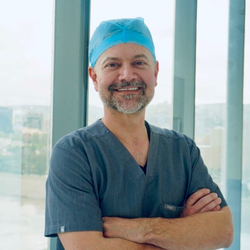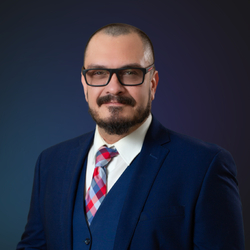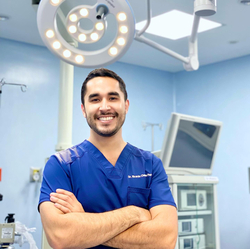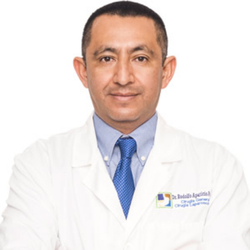Contents
Choose Safest Bariatric Surgery in Mexico Today!
Are you dealing with excess weight and feeling frustrated with failed diets and exhausting workout routines? Obesity isn’t just about appearance—it’s a serious health condition linked to heart disease, diabetes, and joint pain. Many people find themselves stuck in a cycle of trying to lose weight without success, leading to both physical and emotional distress.
If you're looking for a real solution to improve your health and quality of life, Weight Loss Surgery in Mexico could be the answer. However, the high cost of surgery in many countries makes it out of reach for most people. That’s why Mexico has become a top choice for those seeking safe and affordable weight loss procedures.
With experienced bariatric surgeons, modern hospitals, and lower costs, Mexico offers a life-changing opportunity to regain your health and confidence. This guide will help you explore the best weight loss treatments, compare costs, and learn about top surgeons—so you can take the first step toward a healthier you!
Key Insights at a Glance
All-inclusive Packages for Bariatric Surgery in Mexico
Explore Bariatric Surgery packages in Mexico, where PlacidWay has put together low-cost options from our reliable clinics. These packages are designed to give you great care without breaking the bank. Take a look at our listings and find the perfect fit for your needs and budget.
How Much Does Weight Loss Surgery Cost in Mexico?
Obesity Surgery in Mexico offers a more affordable option for those seeking weight loss solutions. The average cost ranges from $3,000 to $7,000, which is much cheaper than the $20,000 to $30,000 typically charged in the US. This means you can save up to 75% while still receiving high-quality care. Factors like additional procedures or materials can affect pricing, but rest assured, affordable care doesn’t mean lower quality. Explore your options today for a healthier future!
Obesity/Bariatric Surgery Centers Cost Comparison in Mexico
| Provider | Procedure | Price |
|---|---|---|
| Hernia Clinic Mexico and Bariatric Center | Gastric Balloon, Obesity/Bariatric Surgery | $3000 |
| Hospital Velmar | Sleeve Gastrectomy, Obesity/Bariatric Surgery | $6899 |
| Alice Beauty Clinic Tijuana | Sleeve Gastrectomy, Obesity/Bariatric Surgery | $4250 |
| Dr. Cristobal Garza - Bariatric Surgeon in Mexico | Gastric Bypass, Obesity/Bariatric Surgery | $6949 |
| Dr. Marco Sariñana - Bariatric Surgeon in Mexico | Bariatric Surgery, Obesity/Bariatric Surgery | $6000 |
Obesity/Bariatric Surgery Cost Comparison in Mexico
| Country | Procedure | Price |
|---|---|---|
| United States | Sleeve Gastrectomy, Obesity/Bariatric Surgery | $18000 |
| Canada | Gastric Bypass, Obesity/Bariatric Surgery | $20500 |
| United States | Gastric Bypass, Obesity/Bariatric Surgery | $25000 |
| Canada | Sleeve Gastrectomy, Obesity/Bariatric Surgery | $19500 |
Recommended Clinics for Weight Loss Surgery in Mexico
Our partner clinics in Mexico focus on bariatric surgery, offering services like gastric bypass and sleeve gastrectomy. These trusted centers provide great care with skilled doctors in modern facilities. Explore below to find the right clinic for you.
Watch Informative Videos Related to Bariatric Surgery in Mexico
Discover helpful videos about Bariatric Surgery in Mexico. These clips can help you understand the process, what to expect, and tips for recovery. They’re here to support you and make you feel ready for your journey. Check out the videos below for insights that can guide you before, during, and after your surgery.
Weight Loss Surgery in Mexico Reviews
Check out real patient stories about Bariatric Surgery in Mexico from Google and Trustpilot. These helpful insights show what to expect and how others felt about their journey!
Most Frequent Asked Questions Related to Obesity Surgeries in Mexico
What is Bariatric Surgery and how does it work in Mexico?
Bariatric Surgery in Mexico refers to surgical procedures designed to help individuals struggling with obesity achieve significant weight loss. Common types include gastric bypass, sleeve gastrectomy, and adjustable gastric banding. These surgeries work by altering the digestive system to limit food intake or nutrient absorption, leading to weight loss. Mexico is known for its high-quality healthcare facilities and experienced surgeons, making it a popular destination for medical tourists seeking these procedures.
What should I consider when choosing a clinic for Obesity Surgery in Mexico?
When selecting a clinic for Bariatric Surgery in Mexico, consider the following factors:
- Accreditation: Ensure the clinic is accredited by recognized medical organizations.
- Surgeon Experience: Research the qualifications and experience of the surgeon performing the procedure.
- Patient Reviews: Look for testimonials from previous patients to gauge satisfaction and outcomes.
- Post-Operative Care: Check what kind of follow-up and support services are available after surgery.
These considerations can help ensure a safe and successful experience.
What is the recovery time for Bariatric Surgery in Mexico?
Recovery time after Obesity Surgery in Mexico varies depending on the type of procedure performed. Generally, patients can expect to stay in the hospital for 1-3 days. After discharge, most patients can return to light activities within 1-2 weeks. However, full recovery may take 4-6 weeks. It's essential to follow your surgeon’s post-operative instructions, including dietary changes and physical activity, to ensure a smooth recovery process.
Are there any risks associated with Bariatric Surgery in Mexico?
Like any surgical procedure, Bariatric Surgery in Mexico carries potential risks. Common risks include:
- Infection: As with any surgery, there is a risk of infection at the incision site.
- Blood Clots: Some patients may develop blood clots in the legs or lungs.
- Nutritional Deficiencies: Post-surgery, it’s crucial to follow a balanced diet to prevent deficiencies.
Choosing an accredited clinic and a qualified surgeon can help minimize these risks significantly.
What should I expect during my consultation for Bariatric Surgery in Mexico?
During your consultation for Obesity Surgery in Mexico, you can expect the following:
- Medical History Review: The surgeon will discuss your medical history and weight loss goals.
- Physical Examination: A physical exam will help determine your suitability for surgery.
- Procedure Explanation: The surgeon will explain the different surgery options and their benefits.
- Questions and Concerns: You’ll have the chance to ask any questions or express concerns.
This consultation is a critical step in ensuring you are well-informed and comfortable with your decision.
How Much Does Bariatric Surgery Cost in Mexico?
Considering weight loss surgery is a monumental step towards a healthier, more vibrant life. It's a decision filled with hope, questions, and, understandably, concerns about the financial investment. If you've been exploring options, you've likely heard about Mexico as a leading destination for bariatric procedures. Offering top-notch medical care and experienced surgeons at prices that are often significantly more accessible than in countries like the United States or Canada, Mexico has become a beacon for individuals seeking a transformative solution to obesity. But "more accessible" still leaves a big question: How much does bariatric surgery actually cost in Mexico? This comprehensive guide will walk you through the various procedures, their estimated costs, the factors that influence these prices, and what you can expect on your journey to a new you. Why Mexico Shines as a Top Choice for Bariatric Surgery Patients Year after year, thousands of international patients travel to Mexico for weight loss surgery, and it's not just about the price tag. Several compelling reasons contribute to Mexico's reputation as a premier destination for bariatric care: Significant Cost Savings: Let's address the elephant in the room – affordability. Bariatric surgery in Mexico can cost up to 70% less than in the U.S. or Canada. This dramatic difference makes life-changing surgery attainable for many who might otherwise find it financially out of reach. World-Class Surgeons: Mexico is home to a wealth of highly skilled, board-certified bariatric surgeons. Many have received training in the U.S. or Europe, are members of international bariatric societies, and have performed thousands of successful procedures. Their expertise is often comparable, if not superior, to that found anywhere in the world. State-of-the-Art Hospitals and Clinics: Reputable bariatric centers in Mexico, especially in cities popular for medical tourism like Tijuana, Cancun, Guadalajara, and Monterrey, operate in modern facilities equipped with the latest surgical technology and adhere to stringent international safety and hygiene standards. Many have dedicated bariatric units and ICUs. All-Inclusive Packages: To cater to international patients, most leading bariatric centers in Mexico offer comprehensive packages. These often include the surgery itself, surgeon and hospital fees, pre-operative tests, anesthesia, hotel accommodation, ground transportation, and sometimes even initial post-operative medications and nutritional guidance. This simplifies the entire process for patients. Reduced Wait Times: In countries with public healthcare systems, wait times for bariatric surgery can be extensive, sometimes years. In Mexico, patients can typically schedule their surgery much more quickly, allowing them to begin their weight loss journey sooner. Personalized and Compassionate Care: Many Mexican bariatric centers are known for providing warm, personalized care. Patients often report feeling well-supported by bilingual staff throughout their experience. Focus on Medical Tourism: The Mexican government and private healthcare sector have actively supported medical tourism, leading to an infrastructure designed to cater to the needs of international patients, ensuring a smoother experience from arrival to departure. These factors, combined, create a compelling case for considering Mexico for your bariatric surgery. Your Surgical Options: A Look at Common Bariatric Procedures in Mexico Bariatric surgery isn't a one-size-fits-all solution. Mexican surgeons offer a range of procedures, each with its own mechanism for promoting weight loss. Understanding these options is key to discussing your needs with a surgeon Gastric Sleeve (Sleeve Gastrectomy): This is currently one of the most popular bariatric procedures worldwide. How it works: About 75-80% of the stomach is surgically removed, leaving a smaller, banana-shaped "sleeve." This significantly restricts the amount of food you can eat and reduces the production of ghrelin, the hunger hormone. Best for: Many individuals with a BMI of 35+ (or 30+ with comorbidities). It's often favored for its relative simplicity and good long-term results. Gastric Bypass (Roux-en-Y Gastric Bypass): Considered the "gold standard" by many, this procedure has a long track record. How it works: A small stomach pouch is created, about the size of an egg. This pouch is then connected directly to a lower section of the small intestine, bypassing a significant portion of the stomach and the upper part of the small intestine. 1 This restricts food intake and reduces calorie and nutrient absorption. Best for: Patients with a higher BMI, those with significant obesity-related health conditions like type 2 diabetes (often shows rapid improvement or remission). Mini Gastric Bypass (One Anastomosis Gastric Bypass - OAGB): A variation of the traditional bypass, gaining popularity. How it works: Similar to the Roux-en-Y, a long, narrow stomach pouch is created. A loop of the small intestine is then connected to this pouch. It involves only one surgical connection (anastomosis) instead of two. Best for: Similar candidates to the Roux-en-Y, and some studies suggest it may offer comparable weight loss with potentially fewer complications and a simpler surgical technique. Duodenal Switch (DS) / Biliopancreatic Diversion with Duodenal Switch (BPD/DS): A more complex but highly effective procedure for significant weight loss. How it works: This procedure combines a sleeve gastrectomy with a significant intestinal bypass, leading to substantial malabsorption of calories and nutrients. Best for: Individuals with a very high BMI (often 50+) or those with severe metabolic syndrome. It offers the highest potential for weight loss but also carries a higher risk of nutritional deficiencies. LAP-BAND® System (Adjustable Gastric Banding) - Less Common Now: How it works: An inflatable silicone band is placed around the upper part of the stomach, creating a small pouch above the band. The tightness of the band can be adjusted. Why it's less common: While popular in the past, its use has declined due to lower average weight loss results compared to sleeve or bypass, and a higher rate of long-term complications or need for re-operation. However, some clinics in Mexico may still offer it. Your surgeon in Mexico will conduct a thorough evaluation, considering your BMI, health conditions, lifestyle, and weight loss goals, to recommend the most appropriate and safest procedure for you. The Price Tag Unveiled: How Much Does Bariatric Surgery Really Cost in Mexico? This is the core question for many considering this journey. It's important to remember that prices are estimates and can vary. The most reliable way to get an exact cost is to have a consultation with specific clinics. However, here’s a breakdown of typical price ranges for common bariatric procedures in Mexico, usually quoted as part of all-inclusive packages: Bariatric Procedure Estimated Cost Range in Mexico (USD) Notes Gastric Sleeve (VSG) $3,900 - $8,900 Most commonly falls in the $4,000 - $6,500 range for standard packages. Gastric Bypass (RNY) $5,000 - $9,000 Often in the $5,500 - $7,500 range. Revision surgeries or complex cases can be higher. Mini Gastric Bypass (OAGB) $4,800 - $7,500 Typically priced similarly to or slightly less than RNY Gastric Bypass. Duodenal Switch (DS) $6,000 - $12,000 A more complex procedure, hence the higher cost. LAP-BAND® (Adjustable Gastric Band) $5,000 - $7,000 Less common; cost can vary. Includes the price of the band device. Revision Surgery (e.g., Band to Sleeve, Sleeve to Bypass) $6,000 - $10,000+ Revisions are generally more complex and thus more costly than primary surgeries. The exact cost depends on the previous surgery and the complexity of the revision. Export to Sheets Key Takeaways on Cost: Significant Savings: Compared to the U.S., where gastric sleeve surgery can cost $15,000-$25,000+ and gastric bypass $20,000-$35,000+, the savings in Mexico are evident. Package Deals are Common: These prices usually reflect "all-inclusive" packages, which we'll detail further. Variation Exists: Prices can fluctuate based on the factors discussed in the next section. Always ensure you understand exactly what is covered in any quoted price. What's Behind the Bill? Factors That Shape Your Bariatric Surgery Cost in Mexico While Mexico offers generally lower prices, the final figure on your quote will be influenced by several key elements: Type of Bariatric Procedure: As seen in the table, more complex procedures like the Duodenal Switch or revision surgeries naturally cost more than a primary Gastric Sleeve due to longer operating times, increased surgical complexity, and sometimes specialized equipment. Surgeon's Experience and Reputation: Highly experienced bariatric surgeons with a strong track record of success and international recognition may charge higher fees. This expertise is invaluable for ensuring safety and optimal outcomes. Hospital or Surgical Center Standards: The quality of the medical facility plays a significant role. Hospitals with JCI accreditation (or other recognized international/national accreditations), advanced technology, dedicated bariatric units, and robust safety protocols may have higher facility fees. This investment in quality is crucial. Geographic Location within Mexico: While generally affordable, there can be slight price variations between popular medical tourism cities like Tijuana, Cancun, Guadalajara, or Monterrey. Tijuana, due to its proximity to the U.S. border and high volume, is often very competitively priced. Inclusions in the Surgical Package: The comprehensiveness of the package is a major factor. Some packages are truly all-inclusive, while others might have fewer components. (More on this in the next section). Length of Hospital and Hotel Stay: Standard packages include a set number of nights. If a longer stay is required due to medical reasons or personal preference, this could add to the cost. Patient's BMI and Medical Complexity: Some surgeons or centers may have an additional fee for patients with a very high BMI (e.g., BMI over 50 or 60) due to the increased technical challenges and potential risks. Complex medical histories might also influence preparations and cost. Pre-operative Testing: While basic pre-op tests are usually included, if you require specialized cardiac evaluations or other extensive testing, this might be an added expense. Post-operative Support and Follow-up: The extent of post-operative nutritional counseling, psychological support, and long-term follow-up included in the package can affect the price. It's vital to have a transparent discussion with your chosen clinic about all these factors to understand the complete cost. More Than Just Surgery: What's Typically Wrapped in a Mexican Bariatric Package? One of the attractive aspects of choosing bariatric surgery in Mexico is the prevalence of all-inclusive packages designed to make the experience smoother for international patients. While the specifics can vary between providers, a comprehensive package usually includes: Surgeon's Fees: Covers the primary bariatric surgeon and often assistant surgeons. Anesthesiologist's Fees: For the administration of general anesthesia. Hospital Fees: This includes operating room costs, nursing care during your hospital stay, medications administered in the hospital, and surgical supplies. Hospital Stay: Typically 1 to 3 nights, depending on the procedure and your recovery progress. Pre-operative Tests: Standard tests like blood work, EKG, and chest X-ray done at the hospital before surgery. Post-operative Medications (Initial Supply): Pain relievers, anti-nausea medication, and sometimes antibiotics to take with you to your hotel. Hotel Accommodation: A set number of nights (often 2-5 nights or more) in a nearby hotel for your initial recovery after hospital discharge. The quality of the hotel can vary. Ground Transportation: Pick-up from a designated airport (commonly San Diego International Airport for Tijuana procedures), transportation between the hotel and hospital for all appointments, and return to the airport. Nutritional Consultation(s): Often includes a pre-operative and/or post-operative consultation with a nutritionist to guide you on dietary changes. Post-operative Follow-up: Initial follow-up with the surgeon before you leave Mexico. Some centers also offer longer-term remote follow-up support. Bilingual Coordinator/Patient Facilitator: To assist with logistics, communication, and support throughout your stay. Medical Tourism Insurance (Increasingly Common): Some packages now include insurance that covers complications for a specified period after surgery, offering peace of mind. What's Usually NOT Included? Flights to and from Mexico (or the border city like San Diego). Passport or Visa fees. Post-operative vitamins and supplements (long-term supply). Meals outside of what might be provided during the hospital stay or at the hotel (e.g., hotel breakfast). Cost of treating unrelated medical conditions or unforeseen major complications requiring extended or specialized care beyond the standard package. Long-term follow-up care with your local physician once you return home. Personal expenses and sightseeing. Always get a detailed written breakdown of what your specific package includes and excludes. Beyond the Savings: Prioritizing Safety, Quality, and Lifelong Results While the cost benefits of bariatric surgery in Mexico are undeniable, your decision should be anchored in considerations of safety, the quality of care, and the potential for long-term success. Never Compromise on Safety: Choosing a surgeon or clinic based solely on the lowest price can be risky. Prioritize experienced, board-certified surgeons and accredited facilities with proven safety records. Quality of Care Matters: Look for comprehensive care that includes thorough pre-operative evaluation, skilled surgical execution, and attentive post-operative support. Commitment to Lifestyle Changes: Bariatric surgery is a powerful tool, not a magic wand. Lasting success depends on your commitment to lifelong changes in diet, exercise, and behavior, as well as adherence to vitamin and supplement regimens. Realistic Expectations: Understand the potential risks and complications associated with any major surgery. Discuss these openly with your surgeon. Also, understand the expected rate of weight loss and the body changes that will occur. Aftercare is Non-Negotiable: Ensure you have a plan for robust aftercare, both immediately post-op and in the long term once you return home. This includes nutritional support, monitoring for deficiencies, and psychological support if needed. A successful bariatric journey is about more than just the initial surgery; it’s about embracing a healthier future. Your Questions Answered: FAQs About Bariatric Surgery Costs in Mexico Is bariatric surgery in Mexico as safe as in the US or Canada? Yes, it can be, provided you choose a highly qualified, board-certified surgeon and a reputable, accredited hospital that adheres to international safety standards. Thorough research is key to ensuring a safe experience. How long do I need to stay in Mexico for bariatric surgery? Most patients stay for about 5 to 10 days in total. This usually includes 1-3 nights in the hospital and several additional days recovering in a nearby hotel, allowing for at least one post-operative check-up before flying home. Can I use my US/Canadian insurance for bariatric surgery in Mexico? Generally, international insurance plans (including U.S. Medicare/Medicaid) do not directly cover bariatric surgery performed in Mexico. The procedures are typically self-pay. However, some patients might be able to seek partial reimbursement from their private insurance company after the fact if they have out-of-network benefits, but this is rare and should be confirmed with the insurer beforehand. What if I have a complication after returning home? This is an important consideration. Reputable Mexican bariatric centers often provide initial support via phone/email. Some packages include medical tourism complication insurance. You should also establish a relationship with a local doctor in your hometown who is aware of your surgery and can provide follow-up care or manage minor issues. For serious complications, you would need to seek local medical attention. Are there financing options for bariatric surgery in Mexico? Yes, many bariatric centers in Mexico partner with third-party medical financing companies (often based in the U.S.) that offer loans to international patients. Some clinics may also offer payment plans or accept credit cards. Besides the surgery cost, what other expenses should I budget for? Primarily flights to and from Mexico (or the border city). Also, consider costs for any prescription medications you need to fill after your initial supply runs out, long-term vitamin and mineral supplements (which are a lifelong necessity), any food for your hotel stay not covered by the package, and personal spending money. Ready to Take the First Step on Your Weight Loss Journey? Exploring bariatric surgery in Mexico is a significant decision, and understanding the costs involved is a crucial part of the planning process. With its combination of skilled surgeons, modern facilities, and considerable cost savings, Mexico offers a viable and often life-changing path to a healthier future. Curious About Your Options? Talk to PlacidWay Now! Navigating the world of medical tourism can be complex, but you don’t have to do it alone. PlacidWay is dedicated to helping patients like you connect with trusted, high-quality bariatric surgery centers and experienced surgeons in Mexico and around the globe. We can provide you with information, help you get personalized quotes, and support you in making an informed choice that aligns with your health goals and budget. Your journey to a healthier, happier you is within reach. Contact PlacidWay today to learn more and take the confident first step towards your transformation!
How Much Does Bariatric Surgery Cost in Mexicali, Mexico?
Are you tired of struggling with your weight and feeling hopeless about ever achieving a healthy body? It's time to take control of your life and finally achieve your weight loss goals! And if you're looking for a cost-effective solution, Mexicali, Mexico may just be the place for you. In this article, we'll take a look at the cost of bariatric surgery in Mexicali, in an emotional and supportive tone. The Cost of Bariatric Surgery in Mexicali, Mexico The cost of bariatric surgery in Mexicali, Mexico can vary depending on the clinic, the surgeon, and the type of procedure. On average, the cost can range from $5,375 to $6,500. But don't let the price fool you, Mexicali is home to some of the best bariatric surgery clinics in Mexico. So, you can rest assured that you'll be getting quality care without breaking the bank. Country Price of Bariatric Surgery Mexicali, Mexico $5,375 - $6,500 United States $20,000 Canada $18,000 The Importance of Choosing the Right Treatment and Location When it comes to bariatric surgery, the treatment and location you choose can greatly impact the outcome of your procedure. And Mexicali is a great place to consider for your surgery. The city is known for its top-notch medical facilities, experienced surgeons, and affordable prices. Just make sure to do your research and choose a clinic that has a good reputation and a track record of success. Overcoming the Emotional and Psychological Challenges of Bariatric Surgery Bariatric surgery is not just a physical journey, but also an emotional and psychological one. It's important to be prepared for the changes and challenges that come with such a drastic weight loss. You may experience mood swings, body image issues, and difficulty adjusting to your new lifestyle. But with the right support and preparation, you can overcome these challenges and enjoy a happier, healthier life. What to Expect After Your Bariatric Surgery in Mexicali, Mexico? After your bariatric surgery in Mexicali, Mexico, you can expect to feel some discomfort and pain for a few days. You'll also need to follow a strict diet and exercise regimen to help your body heal properly. This may include consuming small, frequent meals, avoiding high-fat and sugary foods, and increasing your physical activity. It's important to listen to your body and follow your surgeon's instructions to ensure a successful recovery. The Risks and Side Effects of Bariatric Surgery in Mexicali, Mexico Like any medical procedure, bariatric surgery in Mexicali, Mexico comes with its own set of risks and side effects. Some of the most common risks include infection, malnutrition, and complications from the procedure. However, these risks are rare and can be managed with the help of a qualified surgeon. It's important to discuss the risks and side effects of bariatric surgery with your surgeon before making a decision. How to Choose the Best Surgeon for Your Bariatric Surgery in Mexicali, Mexico? Choosing the right surgeon for your bariatric surgery in Mexicali, Mexico is crucial to a successful outcome. Look for a surgeon with a lot of experience, good reviews, and a high success rate. You can also ask for referrals from friends or family members who have had bariatric surgery, or check online forums and websites for recommendations. Don't be afraid to ask your surgeon questions about their qualifications, experience, and success rate. A good surgeon will be happy to answer your questions and put your mind at ease. Making the Most of Your Trip to Mexicali for Your Bariatric Surgery Mexicali is not just a place for bariatric surgery, it's also a vibrant and exciting city with plenty of things to see and do! So, why not make the most of your trip and turn it into a mini-vacation? You can spend your days exploring the local markets, trying out new restaurants, or simply relaxing and enjoying the sun. Just make sure to listen to your body and take it easy after the procedure. And if you're feeling adventurous, you can take a day trip to the nearby Laguna Salada or visit the famous San Felipe Wineries. In conclusion, bariatric surgery in Mexicali can be a cost-effective and successful option for those who are looking to improve their health and quality of life. Just make sure to do your research, choose the right treatment and location, and have a clear understanding of what to expect before, during, and after the procedure. With the right preparation and care, you can return home with a happier, healthier body and a newfound appreciation for the vibrant city of Mexicali!
Why Tijuana Has Become a Hub for Medical Tourism, Especially for Bariatric Surgery
Tijuana, a bustling city on the border between Mexico and the United States, has emerged as a premier destination for medical tourism, drawing patients from around the globe. This phenomenon is particularly notable in the field of bariatric surgery, where individuals seek medical interventions to aid in weight loss. This blog post explores the reasons behind Tijuana's rise as a medical tourism hotspot, focusing on its reputation for bariatric surgery. We aim to provide a comprehensive overview understandable to readers of all ages. Geographic Proximity One of the primary reasons for Tijuana's popularity among medical tourists, especially those from the United States and Canada, is its geographic proximity. Located just across the border from San Diego, California, Tijuana is easily accessible to millions of North Americans. The convenience of being able to drive or fly a short distance for medical procedures is a significant draw. This ease of access, coupled with the cultural richness of the region, makes Tijuana an attractive destination for those seeking medical care abroad. Cost-Effectiveness Cost is a major factor in the decision to pursue medical treatment in Tijuana. Healthcare in the United States, in particular, can be prohibitively expensive, especially for elective procedures such as bariatric surgery, which are often not covered by insurance. Tijuana offers these services at a fraction of the cost found in the US while maintaining high standards of care. Patients can save up to 50-70% on procedures without compromising on quality, making it an economically wise choice for many. High-Quality Medical Care Contrary to some misconceptions, medical facilities in Tijuana are state-of-the-art, equipped with the latest technology and staffed by highly skilled professionals. Many doctors and surgeons in Tijuana have received part of their training in the United States or other developed countries and are fluent in English, easing the concerns of international patients. The hospitals and clinics specializing in bariatric surgery adhere to stringent standards, often possessing international accreditations that assure the quality of care comparable to what patients would receive in their home countries. Some of the top clinics are: Dr. Jorge Maytorena Bariatric Center Medica Siluet Obesity Surgical Center Comprehensive Packages Medical facilities in Tijuana commonly offer all-inclusive packages for international patients, which cover not just the surgical procedures but also pre-operative evaluations, post-operative care, hotel stays, and transportation to and from the airport and medical appointments. This holistic approach to patient care simplifies the process for travelers, making the medical journey as stress-free as possible. These comprehensive packages also offer transparency in pricing, ensuring that patients know the total cost upfront, without hidden fees. Shorter Waiting Times In many countries, including the United States and Canada, patients can face lengthy waits for elective surgeries. Tijuana's medical facilities, however, typically offer much shorter waiting times, allowing patients to schedule their surgeries quickly and at their convenience. This efficiency not only means that patients can receive timely medical attention but also reduces the time they need to spend away from home and work, making it a practical option for many. Cultural and Touristic Appeal Tijuana itself is a vibrant city with a rich cultural heritage, renowned cuisine, and warm hospitality. Many medical tourists take the opportunity to explore the city and its surroundings before or after their procedures, adding a touristic element to their medical journey. The combination of receiving high-quality medical care while experiencing the attractions of a foreign destination adds an appealing dimension to the concept of medical tourism. Patient Testimonials and Word of Mouth Positive experiences shared by former patients play a crucial role in Tijuana's reputation as a medical tourism hub. Testimonials, reviews, and word-of-mouth recommendations have significantly contributed to the city's growing popularity for bariatric surgery and other medical treatments. The success stories shared on social media and various platforms not only provide real-life insights into the procedures but also help to dispel doubts and build trust among potential patients. A Supportive Environment Lastly, the medical community in Tijuana understands the unique needs of international patients and strives to create a supportive and welcoming environment. From bilingual staff to assistance with travel arrangements and post-operative support groups, the emphasis is on providing a holistic and supportive experience. This patient-centric approach ensures that individuals feel cared for and supported throughout their medical journey. Get Bariatric Surgery in Tijuana Mexico! Tijuana's emergence as a hub for medical tourism, particularly for bariatric surgery, is a multifaceted phenomenon driven by geographic proximity, cost-effectiveness, high-quality medical care, comprehensive service packages, shorter waiting times, cultural appeal, positive testimonials, and a supportive healthcare environment. For individuals considering medical procedures abroad, Tijuana offers a compelling combination of benefits that cater to both their health and comfort needs. As the global landscape of healthcare continues to evolve, Tijuana's role in international medical tourism is likely to grow, further cementing its reputation as a destination for high-quality, affordable medical care.
How much does Gastric Bypass Surgery cost in Mexico?
Dealing with severe obesity can feel like an uphill battle, impacting not just physical health but also emotional well-being and overall quality of life. When traditional methods like diet and exercise haven't provided lasting results, bariatric surgery offers a powerful tool for significant and sustainable weight loss. Among the most effective and time-tested procedures is the Gastric Bypass, medically known as Roux-en-Y Gastric Bypass (RNY). While life-changing, the cost of gastric bypass surgery in countries like the United States and Canada can be extremely high, often putting it out of reach for many individuals who need it most. This financial barrier has led thousands of people to explore high-quality, affordable bariatric surgery options in Mexico. Mexico, particularly cities like Tijuana located conveniently close to the US border, has become a leading international destination for weight loss surgery. It offers experienced surgeons, modern medical facilities, and comprehensive care packages at prices that are often a fraction of those in North America. This guide will provide an in-depth look at gastric bypass surgery, the reasons why Mexico is such a popular choice, the costs involved, how to find a safe and reputable surgeon, and what to expect during the procedure, recovery, and long-term journey. What is Gastric Bypass (Roux-en-Y) Surgery? Gastric Bypass (Roux-en-Y) is often considered the "gold standard" of weight loss surgery due to its long track record of effectiveness. It's both a restrictive and malabsorptive procedure, meaning it helps you lose weight in two main ways: Restriction: The surgeon creates a very small stomach pouch, typically about the size of an egg (holding roughly 1-2 ounces). This dramatically limits the amount of food you can eat at one time, making you feel full much faster. Malabsorption: The small intestine is surgically rerouted. The new, small stomach pouch is connected directly to a lower section of the small intestine (the Roux limb). This bypasses the main part of the stomach and the upper portion of the small intestine (duodenum). As a result, the food you eat mixes with digestive juices further down the digestive tract, leading to fewer calories and nutrients being absorbed by your body. Beyond restriction and malabsorption, gastric bypass also triggers beneficial hormonal changes. Altering the path food takes through your gut influences hormones that regulate hunger and satiety (fullness), often leading to reduced appetite and quicker satisfaction after eating. These hormonal changes also contribute significantly to the improvement or resolution of obesity-related health conditions like type 2 diabetes, often even before substantial weight loss occurs. The procedure is typically performed laparoscopically (using small incisions and specialized instruments), which means less pain, smaller scars, and a faster recovery compared to traditional open surgery. Why is Mexico a Top Choice for Gastric Bypass? Mexico, and especially border cities like Tijuana, has become a major hub for bariatric surgery for several compelling reasons: Massive Cost Savings: This is often the most significant factor. The cost of gastric bypass surgery in Mexico can be up to 70% lower than in the US or Canada. Prices often range from $4,500 to $6,500 USD, compared to $18,000 to $35,000+ north of the border. This dramatic price difference makes life-changing surgery accessible. Experienced Bariatric Surgeons: Mexico has many highly skilled surgeons who specialize exclusively in bariatric procedures. Many have performed thousands of surgeries, received training in the US or other countries, are board-certified by relevant Mexican associations, and stay updated on the latest techniques. Finding a surgeon with high volume and specific expertise in gastric bypass is key. Specialized Bariatric Centers: Reputable providers in Mexico operate within dedicated bariatric centers or well-equipped hospitals, often accredited by national or international bodies (like the Surgical Review Corporation - SRC, which designates Centers of Excellence). These facilities are designed for the specific needs of bariatric patients. Proximity and Convenience: For patients in the US and Canada, Mexico's geographical closeness makes travel much simpler and more affordable than traveling to destinations further afield. Tijuana is particularly convenient, being just a short drive from San Diego. Shorter Wait Times: In countries with public healthcare systems or long insurance approval processes, wait times for bariatric surgery can be extensive. In Mexico, patients can typically schedule their surgery much more quickly. All-Inclusive Packages: Many Mexican bariatric centers offer comprehensive packages designed for international patients. These often bundle the costs of the surgery, hospital stay, surgeon and anesthesia fees, pre-operative tests, necessary medications, ground transportation (e.g., San Diego airport to Tijuana clinic), and sometimes even hotel accommodation for pre/post-op stays. This simplifies planning and budgeting. Proven Track Record: Millions of medical tourists travel to Mexico annually, with bariatric surgery being one of the most sought-after specialties. Countless patients have had successful experiences and achieved significant weight loss and health improvements. While cost is a major draw, the availability of experienced surgeons and high-quality facilities makes Mexico a viable and attractive option for gastric bypass. Who is a Suitable Candidate for Gastric Bypass? Gastric bypass is a major surgery and isn't suitable for everyone. Determining candidacy involves meeting specific criteria related to weight, health, and commitment: Body Mass Index (BMI): Generally, candidates have: A BMI of 40 or higher (classified as severe or morbid obesity). OR a BMI of 35-39.9 with one or more significant obesity-related health problems (comorbidities) such as type 2 diabetes, high blood pressure, severe sleep apnea, high cholesterol, heart disease, or debilitating joint pain. History of Unsuccessful Weight Loss: Candidates should typically have a documented history of trying to lose weight through conventional methods (diet, exercise, medication) without achieving significant or lasting results. Understanding and Commitment: Patients must understand the surgery, including the risks, benefits, and the necessity of lifelong lifestyle changes. This includes adhering to strict dietary guidelines, regular exercise, and taking vitamin/mineral supplements indefinitely. Psychological Readiness: A psychological evaluation may be required to ensure the patient is mentally prepared for the significant changes surgery brings and does not have untreated conditions (like severe depression or eating disorders) that could hinder success. Age: While age limits vary, surgery is typically considered for adults, often between 18 and 65-70 years old, assessed on an individual health basis. Medical Conditions: Certain severe medical conditions might make surgery too risky. A thorough medical evaluation is necessary. Non-Smoker: Patients must quit smoking well in advance of surgery. A reputable bariatric center in Mexico will conduct a thorough screening process, including reviewing your medical history and potentially requiring tests, to ensure you are a suitable and safe candidate for gastric bypass. Understanding Gastric Bypass Costs in Mexico The significantly lower cost is a primary reason patients choose Mexico. While prices vary, here's a breakdown of factors influencing the final cost: Surgeon's Experience and Credentials: Highly experienced, board-certified bariatric surgeons often have higher fees, reflecting their expertise and success rates. Hospital or Surgical Facility: The quality, accreditation (e.g., SRC Center of Excellence), and amenities of the hospital impact the facility fee component of the cost. Package Inclusions: This is key in Mexico. Most reputable centers offer all-inclusive packages. It's crucial to know exactly what's covered. Common inclusions are: Surgeon's fee Anesthesiologist's fee Hospital fees (including operating room, nursing care, medications during stay) Typical hospital stay (usually 2-3 nights for bypass) Pre-operative tests done in Mexico (E.g., EKG, blood work) Post-operative medications (initial supply) Ground transportation (e.g., San Diego airport pickup/drop-off, hotel-hospital transport) Nutritional consultation(s) Basic post-operative follow-up during your stay. Length of Stay: Packages usually cover a standard hospital stay; additional nights might incur extra costs. BMI Surcharge: Some surgeons charge an additional fee for patients with a very high BMI (e.g., over 49 or 50) due to increased surgical complexity. Additional Procedures: Necessary concurrent procedures like hiatal hernia repair or gallbladder removal (gallstones are common after rapid weight loss) will add to the cost. Location: Prices might vary slightly between different cities (Tijuana, Guadalajara, Monterrey, Cancun, etc.). Always get a detailed, written quote confirming all inclusions and potential extra costs before committing. Cost Table: Gastric Bypass in Mexico vs. USA/Canada (USD) The cost difference for gastric bypass surgery between Mexico and North America is substantial. Here’s an estimated comparison: Estimated Gastric Bypass (Roux-en-Y) Costs (USD - As of 2025) Feature Estimated Cost Range in Mexico (USD) Estimated Cost Range in USA/Canada (USD) Estimated Savings Potential Gastric Bypass Surgery (Package Price) $4,500 - $6,500 $18,000 - $35,000+ ~70-85% Mini Gastric Bypass (Package Price) $4,800 - $6,000 (Less commonly performed / variable) Significant Typical Package Inclusions (Mexico) Surgeon Fee, Anesthesia, Hospital Stay (2-3 nights), Pre-op Tests (local), Ground Transport, Initial Meds/Follow-up Surgeon Fee, Anesthesia, Facility Fee only (often excludes hospital stay, tests, etc.) - Disclaimer: These are general estimates based on available data (2025). Actual costs vary significantly based on the specific surgeon, hospital, package details, patient's BMI, need for additional procedures, and length of stay. Always obtain a personalized, itemized quote. The package pricing common in Mexico often provides exceptional value, covering many aspects that are billed separately in the US/Canada, making the total out-of-pocket expense much lower and more predictable for medical tourists. Preparing for Your Gastric Bypass Journey to Mexico Proper preparation is essential for a successful surgery and smooth recovery: Pre-Operative Diet: Most surgeons require patients to follow a specific low-calorie, low-carbohydrate, high-protein diet for 1-4 weeks before surgery. This helps shrink the liver (making surgery safer) and prepares your body. Medical Clearance: Obtain necessary tests and clearance from your primary doctor back home. Share all medical history and medications with your Mexican surgical team. Smoking Cessation: Quit smoking completely at least 4-6 weeks before surgery. Medication Adjustments: Stop blood thinners and certain other medications as directed by the surgeon. Travel Arrangements: Book flights (usually to San Diego - SAN - for Tijuana), confirm ground transportation included in your package, and arrange accommodation if needed for days before/after hospital stay. Support Person: Arrange for a companion to travel with you if possible, as support during recovery is very helpful. Necessary Documents: Ensure your passport is valid. Gather all necessary medical records. Mental Preparation: Understand the surgery and commit to the required lifelong lifestyle changes. Join support groups (online or local) for information and encouragement. Packing: Pack loose, comfortable clothing, necessary toiletries, medications, and items for your hospital stay. Life After Gastric Bypass: Recovery and Long-Term Changes Gastric bypass requires significant adjustments, both short-term during recovery and long-term for sustained success. Recovery Phase: Hospital Stay: Typically 2-3 nights for monitoring, pain management, and starting the liquid diet. Immediate Post-Op Diet: Begins with sips of clear liquids, gradually progressing to full liquids, then pureed foods, then soft foods over approximately 8 weeks. This allows the new stomach pouch and connections to heal. Pain Management: Pain is expected but managed with medication, usually transitioning to over-the-counter options after a few days. Activity: Early ambulation (walking) is crucial to prevent blood clots. Gradually increase activity as tolerated, avoiding heavy lifting or strenuous exercise for about 4-6 weeks. Return to Work: Most people return to desk jobs within 2-4 weeks; more physically demanding jobs require longer. Follow-Up: You'll have a check-up in Mexico before leaving. Long-term follow-up with a bariatric team (back home or potentially remotely with the Mexican center) is essential. Long-Term Lifestyle Changes (Crucial for Success): Dietary Rules: Eat very small portions (your pouch holds only 1-2 oz initially). Eat slowly and chew food thoroughly (to pureed consistency). Prioritize protein at every meal. Avoid high-sugar and high-fat foods (can trigger dumping syndrome). Separate liquids and solids: Don't drink for ~30 minutes before, during, or after meals. Sip fluids throughout the day between meals to stay hydrated (aim for 64+ oz). Vitamin & Mineral Supplementation: LIFELONG supplementation is mandatory due to malabsorption. This typically includes a high-potency multivitamin, calcium citrate, vitamin D, vitamin B12, and iron. Regular blood tests are needed to monitor for deficiencies. Regular Exercise: Incorporating physical activity is vital for weight loss, muscle maintenance, and overall health. Psychological Support: Ongoing support through support groups or therapy can help navigate the emotional and psychological adjustments. Avoiding Alcohol & NSAIDs: Alcohol is absorbed rapidly and can be problematic. NSAIDs (like ibuprofen) increase ulcer risk. Gastric bypass is a tool, not a magic wand. Long-term success depends heavily on adhering to these lifestyle changes. Potential Risks and Complications While gastric bypass is generally safe when performed by experienced surgeons, it is a major surgery with potential short-term and long-term risks: Short-Term Risks: Anastomotic Leak: Leakage from the staple lines or connections (a serious complication requiring immediate attention). Bleeding: Internal or at incision sites. Infection: Wound infection or internal infection (abscess). Blood Clots: Deep Vein Thrombosis (DVT) in the legs or Pulmonary Embolism (PE) in the lungs. Bowel Obstruction: Early blockage of the intestines. Anesthesia-related complications. Long-Term Risks/Complications: Dumping Syndrome: Rapid passage of food (especially sugars/fats) into the small intestine, causing nausea, cramping, diarrhea, dizziness, sweating. Managed with dietary changes. Nutritional Deficiencies: Malabsorption can lead to deficiencies in iron, B12, calcium, vitamin D, folate, thiamine, etc., requiring lifelong supplementation and monitoring. Ulcers: Marginal ulcers can form at the connection between the pouch and intestine (risk increased by smoking, NSAID use). Internal Hernias: Intestines can potentially slip through openings created during surgery, causing obstruction (requires surgical repair). Gallstones: Rapid weight loss increases the risk; gallbladder removal may be recommended preemptively or later. Stomal Stenosis: Narrowing of the opening between the pouch and intestine, causing vomiting; usually treatable with endoscopic dilation. Weight Regain: Possible if dietary guidelines aren't followed long-term or if the pouch stretches. Hair Loss: Temporary hair thinning is common due to rapid weight loss and nutritional shifts. Safety in Mexico: The risks are inherent to the surgery itself, regardless of location. The key to mitigating risks in Mexico is choosing a highly qualified, board-certified surgeon operating in a fully equipped, accredited hospital with robust safety protocols and experienced staff. Thorough research is non-negotiable. Frequently Asked Questions (FAQs) About Gastric Bypass in Mexico How painful is gastric bypass recovery? You will experience abdominal pain and discomfort after surgery, especially for the first week. This is managed with pain medication provided by the hospital and prescribed for home use. Most pain is related to the incisions and internal healing. It typically becomes much more manageable after the first few days. How long does it take to recover from gastric bypass? Initial hospital stay is usually 2-3 nights. You'll likely need 2-4 weeks off work (for non-strenuous jobs). You'll be on a restricted diet (liquids progressing to soft foods) for about 8 weeks. Strenuous activity is limited for 4-6 weeks. Full recovery and adjustment to the new way of eating take several months. How much weight can I expect to lose? Gastric bypass typically results in significant weight loss. Patients often lose 60-80% of their excess body weight within the first 12-18 months. Individual results vary based on starting weight, adherence to diet/exercise, and overall health. What are the biggest long-term dietary changes? You will need to eat very small portions permanently, prioritize protein, chew food extremely well, eat slowly, avoid high-sugar/high-fat foods, and separate liquids from meals. These changes are lifelong requirements for success and avoiding complications like dumping syndrome. Do I really need to take vitamins forever? Yes, absolutely. Due to the malabsorptive nature of gastric bypass, your body cannot absorb sufficient vitamins and minerals from food alone. Lifelong, daily supplementation with specific bariatric vitamins (multivitamin, B12, calcium, iron, Vit D) is crucial to prevent serious nutritional deficiencies. Regular blood tests are needed to monitor levels. Is it safe to have gastric bypass surgery in Mexico? It can be very safe, but depends entirely on your choice of surgeon and facility. Mexico has excellent, highly qualified bariatric surgeons and accredited hospitals with high safety standards, especially in centers catering to medical tourism. However, it's critical to do thorough research: verify surgeon board certifications (CMCOEM), check hospital accreditations (e.g., SRC), read patient reviews extensively, and ensure the center has robust pre- and post-operative protocols. Do not choose based on price alone. Ready to Explore Gastric Bypass in Mexico? PlacidWay Can Help. Gastric bypass surgery offers a powerful opportunity for significant weight loss and improved health for individuals struggling with severe obesity. Mexico provides a high-quality, affordable option, making this life-changing procedure accessible to many more people. Embarking on medical travel for major surgery requires careful planning and research. Finding the right surgeon, verifying credentials, understanding package details, and arranging logistics can seem overwhelming. PlacidWay is here to support you on this journey. We partner with reputable bariatric centers and experienced surgeons in Mexico and worldwide. We can help you: Access information on accredited hospitals and board-certified bariatric surgeons in Mexico. Obtain personalized treatment plans and transparent cost estimates for gastric bypass packages. Facilitate communication and help schedule consultations. Provide resources and guidance for a safe and well-organized medical trip. Connect you with patient support resources. Take the first step towards a healthier future. Contact PlacidWay today to learn more about your gastric bypass surgery options in Mexico. Let us help you navigate the process with confidence and connect you with trusted medical providers.
Top Bariatric Surgeons in Tijuana: Expertise and Patient Success Stories
Weight loss surgery is a life-changing decision, and choosing the right bariatric surgeon is crucial for a successful outcome. Tijuana, Mexico, has become a global hub for weight loss procedures, offering highly skilled surgeons, state-of-the-art medical facilities, and cost-effective treatment options. This guide introduces some of the top bariatric surgeons in Tijuana, covering their expertise, medical facilities, and the benefits of undergoing weight loss surgery in Mexico. Key Insights at a Glance Tijuana has world-class bariatric surgeons with extensive experience. Modern hospitals and clinics follow international safety standards. Weight loss procedures in Tijuana are significantly more affordable. Patients receive comprehensive pre- and post-operative care. Tijuana is a leading destination for medical tourism. Top Bariatric Surgeons in Tijuana, Mexico Tijuana is home to some of the most skilled weight loss surgery specialists, known for their high success rates and commitment to patient care. Below are some of the leading bariatric surgeons in the region. Dr. Jorge Maytorena Specialization: Gastric sleeve, gastric bypass, mini gastric bypass Experience: Over 15 years in bariatric surgery Hospital affiliation: Obesity Bariatric Surgery Center Why choose Dr. Maytorena? He is known for his minimally invasive techniques, ensuring faster recovery and reduced complications. Patient review: "Dr. Maytorena was fantastic! My surgery was smooth, and I felt safe in his care. Best decision of my life!" Dra. Jessica Sigler Specialization: Gastric sleeve, gastric bypass, lap-band revision Experience: 10+ years in obesity surgery Hospital affiliation: Tijuana Bariatric Center Why choose Dra. Sigler? She offers personalized treatment plans and comprehensive post-op support for patients. Dr. Jorge Reyes Mendiola Specialization: Gastric sleeve, gastric bypass, duodenal switch Experience: Over 12 years in weight loss surgery Hospital affiliation: Obesity Surgical Center Why choose Dr. Mendiola? He is known for his advanced laparoscopic techniques and high success rates. Dr. Marco Sariñana Specialization: Gastric sleeve, gastric balloon, duodenal switch Experience: 13+ years in bariatric surgery Hospital affiliation: Family Hospital Why choose Dr. Sariñana? He provides holistic patient care, ensuring long-term weight loss success. Dr. Manuel Núñez Virgen Specialization: Gastric sleeve, gastric bypass, mini gastric bypass Experience: 14+ years in the field Hospital affiliation: Hospital Velmar Why choose Dr. Núñez Virgen? He is highly rated for his patient-centered approach and expertise in revisional bariatric surgeries. Cost Comparison: Weight Loss Surgery in Tijuana vs. USA One of the biggest reasons patients travel to Tijuana for bariatric surgery is the significant cost savings. Here is a price comparison of popular weight loss procedures: Procedure Average Cost in Tijuana Average Cost in the USA Gastric sleeve $4,000 - $6,000 $10,000 - $20,000 Gastric bypass $5,000 - $7,000 $15,000 - $30,000 Mini gastric bypass $5,000 - $7,000 $15,000 - $25,000 Duodenal switch $6,000 - $8,000 $20,000 - $30,000 Gastric balloon $2,500 - $4,000 $8,000 - $14,000 Note: Costs may vary depending on the hospital, surgeon, and specific patient needs. Why Choose Bariatric Surgery in Tijuana? Tijuana has become a medical tourism hotspot for bariatric surgery. Here’s why: Highly qualified surgeons with years of experience Affordable prices, saving up to 70 percent compared to the United States and Canada State-of-the-art facilities that follow international healthcare standards Comprehensive patient care, including pre-op consultations and post-op follow-ups Convenient location, just a short drive from the United States border Did You Know? Bariatric surgery in Tijuana has a 95 percent success rate, with most patients achieving significant weight loss. Tijuana attracts over one million medical tourists annually, with bariatric surgery being one of the top procedures. Many hospitals in Tijuana offer all-inclusive packages, covering accommodation, airport transfers, and medical care. Frequently Asked Questions (FAQs) 1. Is bariatric surgery in Tijuana safe? Yes, bariatric surgery in Tijuana is safe when performed by certified, experienced surgeons in accredited hospitals. Many facilities follow strict international safety protocols, including advanced sterilization methods, modern surgical technology, and comprehensive patient monitoring. To ensure safety, patients should research the surgeon’s credentials, hospital accreditation, and past patient reviews before scheduling a procedure. 2. How do I choose the best bariatric surgeon in Tijuana? Choosing the best surgeon involves checking their board certifications, experience level, and patient success rates. Look for a surgeon who has performed hundreds or thousands of bariatric procedures and specializes in the surgery you need. Reading patient testimonials, checking hospital affiliations, and ensuring they use the latest surgical techniques can also help you make an informed decision. Consulting with the surgeon beforehand can give insight into their approach and care philosophy. 3. What’s included in bariatric surgery packages in Tijuana? Most all-inclusive packages in Tijuana include surgeon and hospital fees, pre-operative consultations, medical tests, anesthesia, medications, and post-operative care. Many clinics also offer hotel accommodations, airport transportation, and bilingual patient coordinators to assist international patients. Some packages even include nutritional counseling and virtual follow-ups to help with long-term weight management after surgery. 4. How long do I need to stay in Tijuana after my surgery? Most patients stay in Tijuana for three to five days after surgery for recovery and follow-up appointments. This allows the medical team to monitor for complications, check incisions, and ensure proper healing before you travel back home. It’s recommended to take one to two weeks off work to allow your body to heal, with some patients requiring a longer recovery period depending on the procedure and their health condition. 5. Can I travel alone for bariatric surgery in Tijuana? Yes, you can travel alone, but bringing a companion is highly recommended for extra support. Some clinics provide transportation, concierge services, and post-surgery assistance for solo travelers. If traveling alone, patients should arrange for a professional caregiver or nurse to assist them during the first few days after surgery. Having a trusted friend or family member can also provide emotional support and help with daily tasks. 6. Will I need follow-up care after my surgery? Yes, follow-up care is crucial for a successful recovery and maintaining long-term weight loss. Most clinics provide virtual follow-ups, diet plans, and nutritional counseling to help patients adjust to their new lifestyle. Regular doctor check-ins, blood tests, and vitamin supplementation may be required to prevent nutrient deficiencies. Patients should also attend support groups or counseling sessions to stay motivated and ensure long-term success. 7. How much weight can I lose after bariatric surgery? Weight loss depends on the procedure, patient commitment, and lifestyle changes. Most patients lose 50 to 70 percent of their excess weight within 12 to 18 months. For example, gastric sleeve and gastric bypass patients can expect to lose 60 to 80 percent of their excess weight within two years. Long-term success depends on following a healthy diet, exercising regularly, and attending follow-up appointments to monitor progress. Start Your Weight Loss Journey with PlacidWay Tijuana offers world-class bariatric care at a fraction of the cost, making it a top choice for weight loss surgery. With experienced surgeons, modern hospitals, and affordable prices, patients can achieve life-changing results with safe and effective procedures. If you’re considering bariatric surgery in Tijuana, PlacidWay can help you find the best surgeons and clinics to match your needs. Contact us today to start your journey toward a healthier future.
What to Expect: Your Post-Op Journey After Bariatric Surgery in Mexico
Bariatric surgery is a life-changing decision, offering individuals the opportunity to achieve significant weight loss and improved health. Many patients choose to have the procedure in Mexico due to affordable costs, high-quality medical care, and experienced surgeons. However, a successful outcome depends not only on the surgery itself but also on proper post-operative care and lifestyle adjustments. This guide provides an overview of what to expect after bariatric surgery in Tijuana, including the recovery timeline, dietary changes, physical activity guidelines, and essential self-care practices. Key Insights at a Glance Hospital stay usually lasts one to two days for monitoring Patients should stay in Mexico for two to three extra days before travelling home Diet progresses from clear liquids to solid foods over several weeks Light walking begins immediately after surgery, while strenuous exercise is avoided for four to six weeks Regular follow-up appointments with the surgical team and local doctors are essential Immediate Recovery After Surgery Hospital Stay in Mexico Most patients spend one to two days in the hospital after bariatric surgery. During this period, medical staff monitor vital signs, manage pain, and ensure there are no immediate complications. Hydration and light movement are encouraged early on to promote blood circulation and reduce the risk of blood clots. Post-Hospital Stay in Mexico After being discharged, it is recommended to stay in Mexico for an additional two to three days before traveling home. This allows time for: Follow-up evaluations with the surgical team Managing initial recovery symptoms such as nausea or fatigue Ensuring there are no post-operative complications before flying or driving home Many clinics offer medical recovery accommodations where patients can rest under supervision before returning to their home country. Recovery Timeline After Bariatric Surgery Each patient’s recovery is different, but the following timeline outlines general post-op expectations: Timeframe What to Expect Days 1-3 Hospital stay, pain management, clear liquid diet, walking encouraged Days 4-7 Transition to a full liquid diet, mild discomfort may continue Weeks 2-3 Introduce pureed foods, incisions start healing, increase activity Weeks 4-5 Soft foods added to the diet, begin light exercise Week 6 and Beyond Resume normal activities, incorporate solid foods gradually Post-Surgery Dietary Guidelines One of the most critical aspects of recovery is following the proper diet to allow the stomach to heal and adapt to smaller food portions. The diet is introduced in four phases: 1. Clear Liquid Diet (Days 1-7) Patients can only consume water, broth, herbal tea, and sugar-free drinks. This phase prepares the stomach for food reintroduction while preventing dehydration. 2. Full Liquid Diet (Weeks 2-3) Gradually introduces protein shakes, blended soups, and unsweetened yogurt. Protein intake is essential to support healing and prevent muscle loss. 3. Pureed Food Diet (Weeks 3-4) Soft, blended foods such as mashed vegetables, scrambled eggs, and blended lean meats are introduced. Small, frequent meals are recommended to prevent overeating and discomfort. 4. Soft and Solid Foods (Week 5 and Beyond) Soft foods like baked fish, soft fruits, and cooked vegetables can be introduced, followed by solid foods in small portions. Patients should chew food thoroughly and avoid high-fat, high-sugar, or processed foods. Physical Activity After Surgery 1. Light Walking (Immediately After Surgery) Patients are encouraged to walk for short distances on the same day as their surgery to promote circulation and prevent blood clots. 2. Increasing Movement (Weeks 2-4) Daily light activities such as walking for 15-30 minutes help in boosting metabolism and reducing stiffness. Avoid heavy lifting and strenuous activities during this phase. 3. Moderate Exercise (Weeks 5-6) Patients can start light strength training, swimming, or stationary cycling under medical supervision. Listen to your body and avoid overexertion. 4. Full Workouts (Week 8 and Beyond) By two months, most patients can return to regular workouts, including strength training and cardiovascular exercises. Caring for Surgical Incisions Proper wound care reduces infection risks and promotes faster healing. Here’s how to care for incisions post-surgery: Keep the incision area clean and dry using mild soap and water Avoid swimming or soaking in a bathtub until the incision is fully healed Monitor for signs of infection such as redness, swelling, or pus Wear loose, comfortable clothing to prevent irritation If any signs of infection appear, contact a healthcare provider immediately. Common Post-Surgery Side Effects 1. Fatigue and Weakness It is normal to feel tired during the first few weeks. Stay hydrated and consume enough protein to regain energy. 2. Nausea and Vomiting Some patients experience mild nausea while adjusting to the new diet. Eating slowly and in small portions can help minimize discomfort. 3. Hair Loss and Nutrient Deficiencies Since nutrient absorption is reduced, patients should take vitamin and mineral supplements as prescribed. Biotin and protein-rich foods can help reduce hair thinning. 4. Dumping Syndrome (Gastric Bypass Patients) Some gastric bypass patients may experience rapid stomach emptying, leading to nausea, dizziness, and diarrhea. Avoid high-sugar foods to prevent this condition. Follow-Up Appointments and Long-Term Care Regular follow-up visits ensure a smooth recovery and long-term success. Patients should schedule: 1st Follow-Up: 1-2 weeks after surgery (virtual or in-person) 2nd Follow-Up: 1 month post-surgery to assess weight loss progress 3rd Follow-Up: 3-6 months post-surgery to check nutrition levels and overall health Annual Check-Ups: Monitor long-term results and address any concerns Many bariatric clinics in Mexico offer virtual follow-ups for international patients. Did You Know? Mexico is one of the top destinations for bariatric surgery, attracting thousands of international patients each year Most bariatric procedures in Mexico are performed using minimally invasive techniques, leading to faster recovery times Many Mexican clinics offer all-inclusive surgery packages, covering surgery, hospital stay, transportation, and follow-up care Frequently Asked Questions (FAQs) 1. How painful is the recovery after bariatric surgery? Most patients experience mild to moderate discomfort due to laparoscopic techniques. Pain is manageable with medication, and most discomfort subsides within a few days. 2. How soon can I travel home after bariatric surgery in Mexico? Patients typically return home 3-5 days after surgery. If flying, short domestic flights are fine after 3 days, but long international flights may require a week of rest before traveling. 3. Can I return to work soon after surgery? Most patients return to desk jobs within 1-2 weeks. If your job requires heavy lifting or physical labor, your surgeon may advise waiting 4-6 weeks. 4. How much weight will I lose in the first six months? On average, patients lose 50-70% of their excess weight within the first 6-12 months, depending on their surgery type, lifestyle changes, and adherence to post-op guidelines. 5. What if I struggle with food cravings after surgery? Cravings are common, especially in the first few months. Drinking water, eating protein-rich meals, and avoiding processed foods can help control cravings. Some patients find support groups or therapy helpful for managing emotional eating. 6. When can I start exercising after surgery? Light walking can start within a few days. Strenuous activities like weightlifting and high-intensity workouts should wait at least 4-6 weeks. Always follow your surgeon’s recommendations. Start Your Weight Loss Journey with PlacidWay Recovery after bariatric surgery in Mexico is a journey that requires commitment and patience. If you’re considering weight loss surgery or need expert post-op support, PlacidWay can connect you with top-rated bariatric clinics and experienced surgeons.
Best Bariatric Surgeons in Mexico
Meet our experienced bariatric surgeons in Mexico, dedicated to providing safe and effective weight loss solutions. Explore their qualifications and how they can assist you on your health journey below.
Why Choose Bariatric Surgery in Mexico?
Get ready on a weight loss journey through bariatric surgery is a significant decision, and choosing the right destination is paramount. Here are compelling reasons why opting for bariatric surgery in Mexico might be the transformative solution you seek.
Combine Treatment with Vacation: Enjoy the unique opportunity to combine your weight loss journey with a vacation in Mexico, taking advantage of luxurious resorts, sunny days, and delicious cuisine for a holistic and positive experience.
Prepare Your Trip for Weight Loss Surgery in Mexico Today!
Ready to take the next step in your weight loss journey? At PlacidWay, we’re here to make the process easy for you. Contact us today to get all the information you need about Bariatric Surgery in Mexico. Our friendly team is ready to assist you every step of the way!




























.png)

.png)







Share this listing